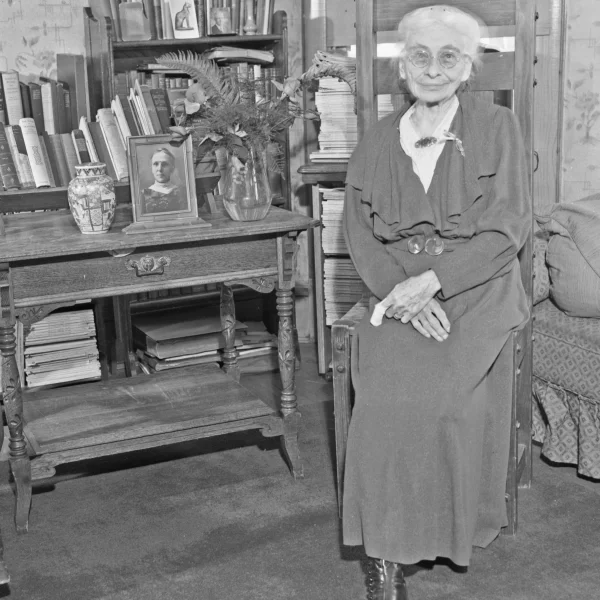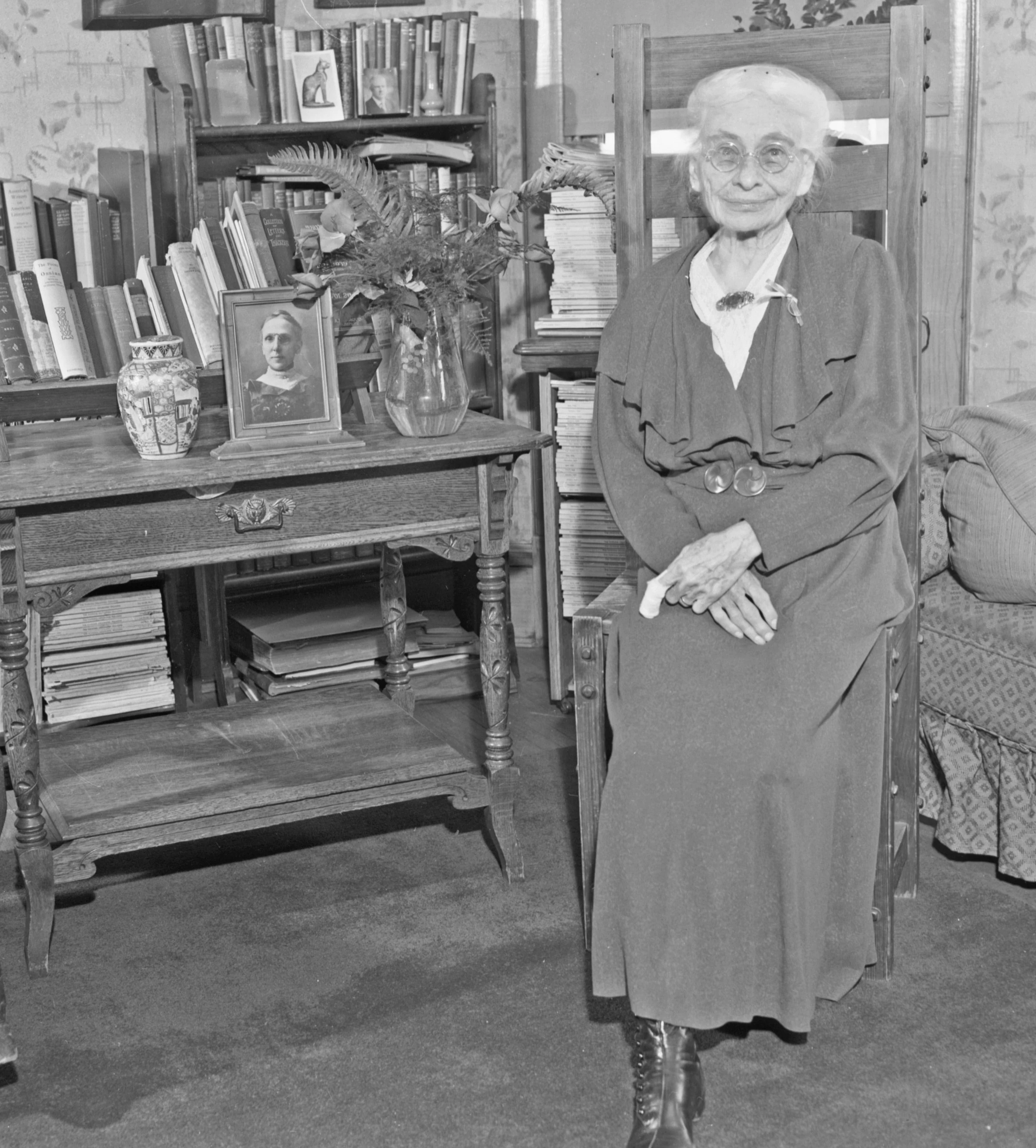“Miss Colby was a most unusual person,” noted Helen Marshall in her centennial history of Illinois State Normal University. “She was an ardent feminist. Regardless of fashion she always had pockets in her skirts, insisting that pockets were as useful to women as to men.”
For nearly four decades, from 1892 to the early 1930s, Professor June Rose Colby taught literature, grammar and composition on the Normal campus, helping to instill a love of the written word in two generations of teachers-in-training.
Unconventional for her times, there was no doubting her devotion to classroom instruction. “She entered into the teaching of Shakespeare with her whole soul,” added Marshall in her 1956 university history. “No one would ever forget the way she read poetry.”
Born in 1856 in Cherry Valley, Ohio, Colby’s early education came on the family’s dairy farm. “My mother was a born teacher,” she once recalled. “I used to stand by the cheese vat and get a geography lesson while she broke up the curd into geographical shapes.” The Colby family eventually moved to Ann Arbor, Mich., apparently so several children could attend the University of Michigan. And sure enough, June Rose went on to earn a four-year A.B. (bachelor’s) degree and an A.M. (master’s) degree, both from Michigan.
She intended to teach Latin and Greek, but found herself increasingly influenced by English poet and critic Matthew Arnold, and his philosophy that “literature is a criticism of life.” Accordingly, Colby overhauled her studies to concentrate on English literature and writing. “I realized that if I wanted to get at people through what I taught,” she said, “it would have to be in my own language.”
The whip-smart Colby then became the first (or one of the first) women to receive a Ph.D. from the University of Michigan. Even so, she found herself unable to secure a college position, and instead taught public high school in Peoria for some six years. Finally, in 1892, she received and accepted an offer from ISNU, becoming the third woman in the school’s history to attain the rank of professorship. As Dr. John B. Freed observed in his definitive history of ISU, Colby’s academic credentials were “more impressive in fact than those of most of her male colleagues.”
Her longtime home was on the north edge of campus at 302 W. Mulberry St. This block is now the stretch of green space to the east of Milner Library along West College Avenue. She never married nor had children.
Colby was small in stature, so much so that she had a special classroom chair made for her. The 11-inch seat was only 19 inches off the floor, though the chair also featured an outsized back so she could rest her head while deep in thought.
Women didn’t gain the constitutional right to ballot box until passage of the 19th amendment in 1920. Colby was one of the best known suffragists in Twin Cities, and her home often served as the meeting place for the Normal Equal Suffrage Association. She was also an unabashed supporter of an early version of the Equal Rights Amendment.
Of late, there has been renewed attention on women educators such as Colby who, while appearing to adhere to the norms and strictures of late 19th and early 20th century pedagogy, were also “silent” academic feminists who employed “discreet” yet “wholly subversive” rhetorical strategies to undermine the patriarchal order of higher education.
Be that as it may, Colby could be delightfully unpredictable. During Word War I, a Red Cross auxiliary was organized on the campus. “Miss Colby, who normally prided herself on not being domestic,” related Helen Marshall, “urged girls and faculty women to join the unit and spend their spare time sewing, making surgical dressings, and rolling bandages in the faculty women’s cloakroom.”
In the spring of 1940, The Pantagraph’s Catherine Lane paid a visit to the 83-year-old Colby at her Mulberry Street home. Sitting in her specially made chair, the “delicate little Miss J. Rose Colby” was charming, witty, insightful and outspoken, as her gray eyes twinkled mischievously throughout the interview.
Having retired nine years earlier, Colby spoke of the many and deep connections she made with faculty members and students alike, as well as the joys of the classroom. “Oh, I loved it!” she exclaimed.
Retirement, though, had its rewards, perhaps none greater than newfound time for reading. “For a year and a half after she retired from teaching,” read the 1940 Pantagraph profile, “Miss Colby returned to her girlhood love of the classics and read Latin, then she took up Greek again and read quite a lot of Xenophon and Plato.”
Colby said her leading literary lights were Homer, Shakespeare, Emerson and Matthew Arnold. On the other hand, the professor remained unimpressed with contemporary American fiction. “I haven’t read Gone with the Wind; don’t think I ever shall,” she declared.
Colby interrupted The Pantagraph’s Lane when the reporter asked about the future of women in the teaching profession. “Don’t say teachers, say all women,” she interjected. “The position of women is still insecure and will be until the Equal Rights Amendment is passed to protect them against discrimination.”
Even though she struggled with health problems, Colby remained buoyant. “I used to be irritated with Emerson because I felt he overlooked the unpleasant side of life,” she said, “but I am more optimistic now than when I was a girl.”
June Rose Colby passed away at her Mulberry Street home on May 11, 1941, fifteen months after her interview with Catherine Lane. The Pantagraph eulogized her as a “citizen at large of the whole world of thought.” She was laid to rest at what is today Evergreen Memorial Cemetery.
The Dr. Jo Ann Rayfield Archives at ISU holds the June Rose Colby Papers, which include many of her academic writings, teaching notes, poems, correspondence, photographs and other fascinating items that speak to her life and career.
In 1960, ISU opened Hamilton-Whitten, two linked 10-story residence halls. Two years later, two nearly identical halls, Atkin-Colby, were added to the complex that included Feeney Dining Center. The five buildings were named for women with connections to the early decades of university—Alma Mary Hamilton, Jennie A. Whitten, Mae Warren Feeney, Edith Irene Atkin and June Rose Colby.
This residential hall complex, one of the finest local examples of International Style modernism, fell to the wrecking ball in 2016. Certainly there must be some planned or proposed ISU building that could carry again the name of Professor June Rose Colby.

